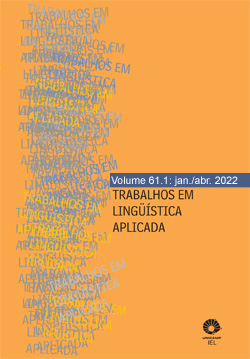Abstract
It is impossible to think about the history of foreign language teaching without reflecting on coursebook materials. They have taken such a significant role in language teaching that their presence in the educational process becomes an imperative – or, at least, a desire. Despite being an instrument of democratization of language learning in theory, the coursebook material may homogenize teaching and learning practices, erasing learners’ subjectivities, and offering a pasteurized view of the social world. Considering this scenario, this article aims at investigating the language ideologies that orient the construction of the social category identified as “refugees” in the collection Raise up!, which is characterized as a collection of coursebooks in favor of diversity. Based on the theoretic-analytical construct of language ideologies (WOOLARD, 1998; KROSKRITY, 2004) and the semiotic processes of iconization, fractal recursivity and erasure (IRVINE; GAL, 2000), it is understood that the coursebook’s theoretical conception indexes discourses of social transformation; however, the activities proposed throughout the lessons still rely on a perspective of English as a system of bounded signs. Consequently, the subjectivity in focus is built on a process of cleanliness of linguistic, political, and social traits, indexing a structuralist and “purist” language ideology aligned with the modern rationale.
References
Agência da ONU para refugiados (ACNUR). (2020). Refugiados. Brasil. Disponível em: https://www.acnur.org/portugues/quem-ajudamos/refugiados/. Acesso em: 15 de dez. de 2020.
AUSTIN, J. L. (1990). Quando dizer é fazer. Trad. Danilo Marcondes de Souza Filho. Porto Alegre: Artes Médica.
BARCELOS, S.; SCHLUDE, V. (2018). Materiais didáticos para o ensino de língua inglesa no projeto CLAC. In: TILIO, R.; BEATO-CANATO, A. P. M. (org.) Formação inicial de professores de línguas: experiências em um projeto de extensão universitária. Campinas: Pontes Editorial, p. 75 – 97.
BLOMMAERT, J. (2005). Discourse. Cambridge: Cambridge University Press.
BRAIT, B. (2018). Análise e teoria do Discurso. In: BRAIT, B. (Org.) Bakhtin: outros conceitos-chave. São Paulo, Contexto, p. 9-32.
CARNEIRO, A. S. R. (2015). Conflicts around the (de)construction of legitimate languages. In: MOITA LOPES, L. P. (Org.). Global Portuguese. Linguistic ideologies in late modernity. Nova York: Routledge.
Common European Framework of Reference for Languages: Learning, teaching, assessment. (2001). Cambridge: Cambridge University Press. Disponível em: https://rm.coe.int/1680459f97. Acesso em: 13 de dez. de 2020.
EAGLETON, T. (1997). Ideologia: uma introdução. São Paulo: Boitempo Editorial.
FOUCAULT, M. (1979). Microfísica do poder. Rio de Janeiro: Graal.
GEE, J. P. (2000). The New Literacy Studies: From “Socially Situated” to the Work of the Social. In: Barton, D; Hamilton, M.; Ivanic, R. (eds). Situated Literacies: Reading and Writing in Context. London: Routledge, p. 180-196.
KROSKRITY, P. V. (2004). Language ideologies. In: Duranti, A. (ed.). A Companion to Linguistic Anthropology. Blackwell Publishing, p. 496-517.
IRVINE, J.T.; GAL, S. (2000). Language ideology and linguistic differentiation. In: KROSKRITY, P. (Org.). Regimes of language, ideologies, politics and identities. Santa Fe: School of American Research Press, p. 35-83.
LAGERCRANTZ, D. (2017). O homem que buscava sua sombra. São Paulo: Companhia das Letras.
LIVIA, A; HALL, K. (2010). “É uma menina!”: a volta da performatividade à linguística. In: OSTERMANN, A. C.; FONTANA, B. (eds.), Linguagem, gênero, sexualidade: clássicos traduzidos. São Paulo: Parábola Editorial, p. 109-127.
MARTINS, H. (2001) Sobre a estabilidade do significado em Wittgenstein. Veredas, Revista de Estudos Linguísticos, Juiz de Fora, v. 4, n. 2, p. 19-42.
MEDVIÉDEV, P. N. (1928). O método formal nos estudos literários: introdução crítica a uma poética sociológica. Tradução de Sheila Grillo e Ekaterina Vólkova Américo. São Paulo: Contexto, 2016.
MIOTELLO, V. (2005). Ideologia. In: BRAIT, B. Bakhtin: conceitos-chave. São Paulo: Contexto, 2005, p. 167-176.
MOITA LOPES, L. P. (2013). Ideology in research methodology. In: CHAPELLE, C. A. (ed.), The encyclopedia of applied linguistics, Nova York: Wiley Blackwell, p. 1-6.
MOITA LOPES, L. P.; FABRÍCIO, B. F. (2018). Viagem textual pelo sul global: ideologias linguísticas queer e metapragmáticas translocais. Linguagem em (Dis)Curso (Online), v. 18, 2018, p. 769-784.
SZUNDY, P. T. C. (no prelo). Conflicting Language Ideologies About What Counts as “English” in the Brazilian National Common Core Curriculum: Arenas for Permanences and Disruptions. In: RUBDY, R.; TUPAS, R. (Org.). Bloomsburry World Englishes.
TAYLOR, J. M.; COIMBRA, I. (2019). Raise up! - A diverse and inclusive view of English. TaylorMade English.
TÍLIO, R. (2016). Guia didático. In: Voices Plus 1: Manual do professor. São Paulo: Richmond, p. 193 – 240.
VOLÓCHINOV, V. (1929). Marxismo e filosofia da linguagem. São Paulo: Editora 34, 2017.
WOOLARD, K. A. (1998). Introduction. In: SCHIEFFELIN, BAMBI B., WOOLARD, K. A. & KROSKRITY, PAUL V. (eds.). Language ideologies practice and theory. Oxford: Oxford University Press, p. 3-47.

This work is licensed under a Creative Commons Attribution 4.0 International License.
Copyright (c) 2022 Trabalhos em Linguística Aplicada


